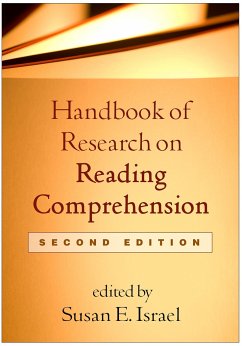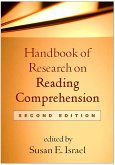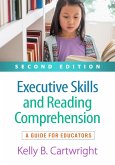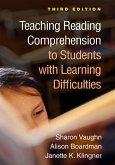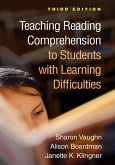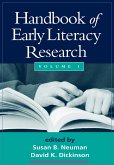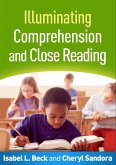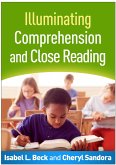Handbook of Research on Reading Comprehension
Herausgeber: Israel, Susan E
Handbook of Research on Reading Comprehension
Herausgeber: Israel, Susan E
- Broschiertes Buch
- Merkliste
- Auf die Merkliste
- Bewerten Bewerten
- Teilen
- Produkt teilen
- Produkterinnerung
- Produkterinnerung
This esteemed reference work and professional resource, now substantially revised, integrates classic and cutting-edge research on how children and adolescents make meaning from text. The comprehension tasks and challenges facing students at different grade levels are explored, with attention to multiple text types and reading purposes. Preeminent researchers offer a range of perspectives--cognitive, neuroscientific, sociocultural, pedagogical, and technological--on key aspects of comprehension. Effective approaches to assessment, instruction, and intervention are reviewed. The volume also…mehr
Andere Kunden interessierten sich auch für
![Handbook of Research on Reading Comprehension Handbook of Research on Reading Comprehension]() Handbook of Research on Reading Comprehension169,99 €
Handbook of Research on Reading Comprehension169,99 €![Executive Skills and Reading Comprehension Executive Skills and Reading Comprehension]() Kelly B. CartwrightExecutive Skills and Reading Comprehension58,99 €
Kelly B. CartwrightExecutive Skills and Reading Comprehension58,99 €![Teaching Reading Comprehension to Students with Learning Difficulties Teaching Reading Comprehension to Students with Learning Difficulties]() Sharon Vaughn (United States The University of Texas at Austin)Teaching Reading Comprehension to Students with Learning Difficulties71,99 €
Sharon Vaughn (United States The University of Texas at Austin)Teaching Reading Comprehension to Students with Learning Difficulties71,99 €![Teaching Reading Comprehension to Students with Learning Difficulties Teaching Reading Comprehension to Students with Learning Difficulties]() Sharon Vaughn (United States The University of Texas at Austin)Teaching Reading Comprehension to Students with Learning Difficulties49,99 €
Sharon Vaughn (United States The University of Texas at Austin)Teaching Reading Comprehension to Students with Learning Difficulties49,99 €![Handbook of Early Literacy Research, Volume 1 Handbook of Early Literacy Research, Volume 1]() Handbook of Early Literacy Research, Volume 173,99 €
Handbook of Early Literacy Research, Volume 173,99 €![Illuminating Comprehension and Close Reading Illuminating Comprehension and Close Reading]() Isabel L BeckIlluminating Comprehension and Close Reading86,99 €
Isabel L BeckIlluminating Comprehension and Close Reading86,99 €![Illuminating Comprehension and Close Reading Illuminating Comprehension and Close Reading]() Isabel L BeckIlluminating Comprehension and Close Reading46,99 €
Isabel L BeckIlluminating Comprehension and Close Reading46,99 €-
-
-
This esteemed reference work and professional resource, now substantially revised, integrates classic and cutting-edge research on how children and adolescents make meaning from text. The comprehension tasks and challenges facing students at different grade levels are explored, with attention to multiple text types and reading purposes. Preeminent researchers offer a range of perspectives--cognitive, neuroscientific, sociocultural, pedagogical, and technological--on key aspects of comprehension. Effective approaches to assessment, instruction, and intervention are reviewed. The volume also addresses issues in teaching specific populations, including struggling readers and English language learners. &
Hinweis: Dieser Artikel kann nur an eine deutsche Lieferadresse ausgeliefert werden.
Hinweis: Dieser Artikel kann nur an eine deutsche Lieferadresse ausgeliefert werden.
Produktdetails
- Produktdetails
- Verlag: Guilford Publications
- 2 New edition
- Seitenzahl: 696
- Erscheinungstermin: 2. Januar 2017
- Englisch
- Abmessung: 255mm x 182mm x 34mm
- Gewicht: 1280g
- ISBN-13: 9781462528882
- ISBN-10: 1462528880
- Artikelnr.: 45195123
- Herstellerkennzeichnung
- Libri GmbH
- Europaallee 1
- 36244 Bad Hersfeld
- gpsr@libri.de
- Verlag: Guilford Publications
- 2 New edition
- Seitenzahl: 696
- Erscheinungstermin: 2. Januar 2017
- Englisch
- Abmessung: 255mm x 182mm x 34mm
- Gewicht: 1280g
- ISBN-13: 9781462528882
- ISBN-10: 1462528880
- Artikelnr.: 45195123
- Herstellerkennzeichnung
- Libri GmbH
- Europaallee 1
- 36244 Bad Hersfeld
- gpsr@libri.de
I. Historical Analysis
1. Introduction: The Consequential Pulse of Reading Comprehension Research,
Susan E. Israel and D. Ray Reutzel
2. The Roots of Reading Comprehension Instruction, P. David Pearson & Gina
N. Cervetti
3. Comprehension Is Not Simple: Considering the Persisting Dangers in the
Simple View of Reading Comprehension, James V. Hoffman
4. Professional Learning for Educators Focused on Reading Comprehension: A
Historical Perspective, Barbara Laster & Carla Finkelstein
5. Research on Helping Readers Make Sense of Print: Evolution of
Comprehension-Based Pedagogy, Kenneth S. Goodman, Yetta M. Goodman, & Kelly
L. Allen
II. Theoretical Perspectives
6. An Evolving Perspective of Constructively Responsive Reading
Comprehension Strategies in Multilayered Digital Text Environments,
Byeong-Young Cho & Peter Afflerbach
7. Toward a Theory of Literacy Meaning Making within Virtual Worlds,
Richard Beach and Robert J. Tierney
8. Meaning Making in the 21st Century: The Sociogenesis of Reading
Comprehension, James Gavelek & Colleen E. Whittingham
9. Literacy, Comprehension, and the Neurosciences, George G. Hruby
III. Diagnosis, Assessment, and Intervention
10. Assessments of Reading Comprehension: Challenges and Directions, Lauren
Leslie and JoAnne Schudt Caldwell
11. Using Assessments to Map and Evaluate the Comprehension Development of
Young Children, Katherine A. Dougherty Stahl & Georgia Earnest García
12. Comprehension Difficulties and Struggling Readers, Richard L. Allington
& Anne McGill-Franzen
13. Self-Regulation and Reading Comprehension: Moving Beyond the
Individual's Cognition in Regulated Learning, Dixie D. Massey & Samuel D.
Miller
14. Reconsidering Fluency's Role in Reading Comprehension, Melanie Kuhn &
Paula J. Schwanenflugel
IV. Impact of Text and Higher-Order Processing
15. Text and Comprehension: A Retrospective, Perspective, and Prospective,
Emily Fox & Patricia A. Alexander
16. Reading Comprehension in the Middle Grades: Characteristics,
Challenges, and Effective Supports, Ruth Wharton-McDonald & Joy Erickson
17. Vocabulary and Reading Comprehension: The Nexus of Meaning, Gwynne
Ellen Ash & James F. Baumann
18. Improving Adolescent Comprehension: Developing Strategies in the
Content Areas, Mark W. Conley
19. Structure, Epistemology, and Metalanguage Foundations of Reading
Comprehension in Scientific Texts, Linda M. Phillips & Anat Yarden
20. Graphic Text and Visual Literacies in Reading Comprehension, Stergios
Botzakis, Jason D. DeHart, & Sean P. Connors
V. Diverse Components and Engagement
21. Reading Comprehension Research and the Shift Toward Culturally
Sustaining Pedagogy, Colleen M. Fairbanks, Jewell E. Cooper, Sandra M.
Webb, & Lynn A. Masterson
22. Comprehension in the Disciplines, Cynthia Shanahan
23. Constructing Meaning through Discussion, Keli Garas-York & Janice F.
Almasi
24. The Role of Interest in Reading Comprehension, Sheree E. Springer,
Janice A. Dole, & Douglas J. Hacker
25. Comprehension Strategies Instruction for Learners of English: Where We
Have Been, Where We Are Now, Where We Still Might Go, Rachel Brown
26. Family Literacy Initiatives and Reading Comprehension, Patricia A.
Edwards, Maria Selena Protacio, Marliese Peltier, & Laura Hopkins
VI. Future Directions
27. The Role of Literacy Coaching in Improving Comprehension Instruction,
Misty Sailors, Sylvia Minton, & Lorena Villarreal
28. Public Policy in an Era of Changing Literacies: A Focus on Reading
Comprehension, Lori Helman & Cory Stai
29. Sophistication of Reading Comprehension: Where to from Here?, Susan E.
Israel
1. Introduction: The Consequential Pulse of Reading Comprehension Research,
Susan E. Israel and D. Ray Reutzel
2. The Roots of Reading Comprehension Instruction, P. David Pearson & Gina
N. Cervetti
3. Comprehension Is Not Simple: Considering the Persisting Dangers in the
Simple View of Reading Comprehension, James V. Hoffman
4. Professional Learning for Educators Focused on Reading Comprehension: A
Historical Perspective, Barbara Laster & Carla Finkelstein
5. Research on Helping Readers Make Sense of Print: Evolution of
Comprehension-Based Pedagogy, Kenneth S. Goodman, Yetta M. Goodman, & Kelly
L. Allen
II. Theoretical Perspectives
6. An Evolving Perspective of Constructively Responsive Reading
Comprehension Strategies in Multilayered Digital Text Environments,
Byeong-Young Cho & Peter Afflerbach
7. Toward a Theory of Literacy Meaning Making within Virtual Worlds,
Richard Beach and Robert J. Tierney
8. Meaning Making in the 21st Century: The Sociogenesis of Reading
Comprehension, James Gavelek & Colleen E. Whittingham
9. Literacy, Comprehension, and the Neurosciences, George G. Hruby
III. Diagnosis, Assessment, and Intervention
10. Assessments of Reading Comprehension: Challenges and Directions, Lauren
Leslie and JoAnne Schudt Caldwell
11. Using Assessments to Map and Evaluate the Comprehension Development of
Young Children, Katherine A. Dougherty Stahl & Georgia Earnest García
12. Comprehension Difficulties and Struggling Readers, Richard L. Allington
& Anne McGill-Franzen
13. Self-Regulation and Reading Comprehension: Moving Beyond the
Individual's Cognition in Regulated Learning, Dixie D. Massey & Samuel D.
Miller
14. Reconsidering Fluency's Role in Reading Comprehension, Melanie Kuhn &
Paula J. Schwanenflugel
IV. Impact of Text and Higher-Order Processing
15. Text and Comprehension: A Retrospective, Perspective, and Prospective,
Emily Fox & Patricia A. Alexander
16. Reading Comprehension in the Middle Grades: Characteristics,
Challenges, and Effective Supports, Ruth Wharton-McDonald & Joy Erickson
17. Vocabulary and Reading Comprehension: The Nexus of Meaning, Gwynne
Ellen Ash & James F. Baumann
18. Improving Adolescent Comprehension: Developing Strategies in the
Content Areas, Mark W. Conley
19. Structure, Epistemology, and Metalanguage Foundations of Reading
Comprehension in Scientific Texts, Linda M. Phillips & Anat Yarden
20. Graphic Text and Visual Literacies in Reading Comprehension, Stergios
Botzakis, Jason D. DeHart, & Sean P. Connors
V. Diverse Components and Engagement
21. Reading Comprehension Research and the Shift Toward Culturally
Sustaining Pedagogy, Colleen M. Fairbanks, Jewell E. Cooper, Sandra M.
Webb, & Lynn A. Masterson
22. Comprehension in the Disciplines, Cynthia Shanahan
23. Constructing Meaning through Discussion, Keli Garas-York & Janice F.
Almasi
24. The Role of Interest in Reading Comprehension, Sheree E. Springer,
Janice A. Dole, & Douglas J. Hacker
25. Comprehension Strategies Instruction for Learners of English: Where We
Have Been, Where We Are Now, Where We Still Might Go, Rachel Brown
26. Family Literacy Initiatives and Reading Comprehension, Patricia A.
Edwards, Maria Selena Protacio, Marliese Peltier, & Laura Hopkins
VI. Future Directions
27. The Role of Literacy Coaching in Improving Comprehension Instruction,
Misty Sailors, Sylvia Minton, & Lorena Villarreal
28. Public Policy in an Era of Changing Literacies: A Focus on Reading
Comprehension, Lori Helman & Cory Stai
29. Sophistication of Reading Comprehension: Where to from Here?, Susan E.
Israel
I. Historical Analysis
1. Introduction: The Consequential Pulse of Reading Comprehension Research,
Susan E. Israel and D. Ray Reutzel
2. The Roots of Reading Comprehension Instruction, P. David Pearson & Gina
N. Cervetti
3. Comprehension Is Not Simple: Considering the Persisting Dangers in the
Simple View of Reading Comprehension, James V. Hoffman
4. Professional Learning for Educators Focused on Reading Comprehension: A
Historical Perspective, Barbara Laster & Carla Finkelstein
5. Research on Helping Readers Make Sense of Print: Evolution of
Comprehension-Based Pedagogy, Kenneth S. Goodman, Yetta M. Goodman, & Kelly
L. Allen
II. Theoretical Perspectives
6. An Evolving Perspective of Constructively Responsive Reading
Comprehension Strategies in Multilayered Digital Text Environments,
Byeong-Young Cho & Peter Afflerbach
7. Toward a Theory of Literacy Meaning Making within Virtual Worlds,
Richard Beach and Robert J. Tierney
8. Meaning Making in the 21st Century: The Sociogenesis of Reading
Comprehension, James Gavelek & Colleen E. Whittingham
9. Literacy, Comprehension, and the Neurosciences, George G. Hruby
III. Diagnosis, Assessment, and Intervention
10. Assessments of Reading Comprehension: Challenges and Directions, Lauren
Leslie and JoAnne Schudt Caldwell
11. Using Assessments to Map and Evaluate the Comprehension Development of
Young Children, Katherine A. Dougherty Stahl & Georgia Earnest García
12. Comprehension Difficulties and Struggling Readers, Richard L. Allington
& Anne McGill-Franzen
13. Self-Regulation and Reading Comprehension: Moving Beyond the
Individual's Cognition in Regulated Learning, Dixie D. Massey & Samuel D.
Miller
14. Reconsidering Fluency's Role in Reading Comprehension, Melanie Kuhn &
Paula J. Schwanenflugel
IV. Impact of Text and Higher-Order Processing
15. Text and Comprehension: A Retrospective, Perspective, and Prospective,
Emily Fox & Patricia A. Alexander
16. Reading Comprehension in the Middle Grades: Characteristics,
Challenges, and Effective Supports, Ruth Wharton-McDonald & Joy Erickson
17. Vocabulary and Reading Comprehension: The Nexus of Meaning, Gwynne
Ellen Ash & James F. Baumann
18. Improving Adolescent Comprehension: Developing Strategies in the
Content Areas, Mark W. Conley
19. Structure, Epistemology, and Metalanguage Foundations of Reading
Comprehension in Scientific Texts, Linda M. Phillips & Anat Yarden
20. Graphic Text and Visual Literacies in Reading Comprehension, Stergios
Botzakis, Jason D. DeHart, & Sean P. Connors
V. Diverse Components and Engagement
21. Reading Comprehension Research and the Shift Toward Culturally
Sustaining Pedagogy, Colleen M. Fairbanks, Jewell E. Cooper, Sandra M.
Webb, & Lynn A. Masterson
22. Comprehension in the Disciplines, Cynthia Shanahan
23. Constructing Meaning through Discussion, Keli Garas-York & Janice F.
Almasi
24. The Role of Interest in Reading Comprehension, Sheree E. Springer,
Janice A. Dole, & Douglas J. Hacker
25. Comprehension Strategies Instruction for Learners of English: Where We
Have Been, Where We Are Now, Where We Still Might Go, Rachel Brown
26. Family Literacy Initiatives and Reading Comprehension, Patricia A.
Edwards, Maria Selena Protacio, Marliese Peltier, & Laura Hopkins
VI. Future Directions
27. The Role of Literacy Coaching in Improving Comprehension Instruction,
Misty Sailors, Sylvia Minton, & Lorena Villarreal
28. Public Policy in an Era of Changing Literacies: A Focus on Reading
Comprehension, Lori Helman & Cory Stai
29. Sophistication of Reading Comprehension: Where to from Here?, Susan E.
Israel
1. Introduction: The Consequential Pulse of Reading Comprehension Research,
Susan E. Israel and D. Ray Reutzel
2. The Roots of Reading Comprehension Instruction, P. David Pearson & Gina
N. Cervetti
3. Comprehension Is Not Simple: Considering the Persisting Dangers in the
Simple View of Reading Comprehension, James V. Hoffman
4. Professional Learning for Educators Focused on Reading Comprehension: A
Historical Perspective, Barbara Laster & Carla Finkelstein
5. Research on Helping Readers Make Sense of Print: Evolution of
Comprehension-Based Pedagogy, Kenneth S. Goodman, Yetta M. Goodman, & Kelly
L. Allen
II. Theoretical Perspectives
6. An Evolving Perspective of Constructively Responsive Reading
Comprehension Strategies in Multilayered Digital Text Environments,
Byeong-Young Cho & Peter Afflerbach
7. Toward a Theory of Literacy Meaning Making within Virtual Worlds,
Richard Beach and Robert J. Tierney
8. Meaning Making in the 21st Century: The Sociogenesis of Reading
Comprehension, James Gavelek & Colleen E. Whittingham
9. Literacy, Comprehension, and the Neurosciences, George G. Hruby
III. Diagnosis, Assessment, and Intervention
10. Assessments of Reading Comprehension: Challenges and Directions, Lauren
Leslie and JoAnne Schudt Caldwell
11. Using Assessments to Map and Evaluate the Comprehension Development of
Young Children, Katherine A. Dougherty Stahl & Georgia Earnest García
12. Comprehension Difficulties and Struggling Readers, Richard L. Allington
& Anne McGill-Franzen
13. Self-Regulation and Reading Comprehension: Moving Beyond the
Individual's Cognition in Regulated Learning, Dixie D. Massey & Samuel D.
Miller
14. Reconsidering Fluency's Role in Reading Comprehension, Melanie Kuhn &
Paula J. Schwanenflugel
IV. Impact of Text and Higher-Order Processing
15. Text and Comprehension: A Retrospective, Perspective, and Prospective,
Emily Fox & Patricia A. Alexander
16. Reading Comprehension in the Middle Grades: Characteristics,
Challenges, and Effective Supports, Ruth Wharton-McDonald & Joy Erickson
17. Vocabulary and Reading Comprehension: The Nexus of Meaning, Gwynne
Ellen Ash & James F. Baumann
18. Improving Adolescent Comprehension: Developing Strategies in the
Content Areas, Mark W. Conley
19. Structure, Epistemology, and Metalanguage Foundations of Reading
Comprehension in Scientific Texts, Linda M. Phillips & Anat Yarden
20. Graphic Text and Visual Literacies in Reading Comprehension, Stergios
Botzakis, Jason D. DeHart, & Sean P. Connors
V. Diverse Components and Engagement
21. Reading Comprehension Research and the Shift Toward Culturally
Sustaining Pedagogy, Colleen M. Fairbanks, Jewell E. Cooper, Sandra M.
Webb, & Lynn A. Masterson
22. Comprehension in the Disciplines, Cynthia Shanahan
23. Constructing Meaning through Discussion, Keli Garas-York & Janice F.
Almasi
24. The Role of Interest in Reading Comprehension, Sheree E. Springer,
Janice A. Dole, & Douglas J. Hacker
25. Comprehension Strategies Instruction for Learners of English: Where We
Have Been, Where We Are Now, Where We Still Might Go, Rachel Brown
26. Family Literacy Initiatives and Reading Comprehension, Patricia A.
Edwards, Maria Selena Protacio, Marliese Peltier, & Laura Hopkins
VI. Future Directions
27. The Role of Literacy Coaching in Improving Comprehension Instruction,
Misty Sailors, Sylvia Minton, & Lorena Villarreal
28. Public Policy in an Era of Changing Literacies: A Focus on Reading
Comprehension, Lori Helman & Cory Stai
29. Sophistication of Reading Comprehension: Where to from Here?, Susan E.
Israel

